Related Research Articles
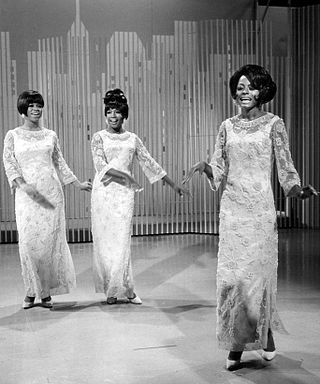
The Supremes was an American girl group and a premier act of Motown Records during the 1960s. Founded as the Primettes in Detroit, Michigan, in 1959, the Supremes were the most commercially successful of Motown's acts and the most successful American vocal band, with 12 number-one singles on the Billboard Hot 100. Most of these hits were written and produced by Motown's main songwriting and production team, Holland–Dozier–Holland. It is said that their breakthrough made it possible for future African-American R&B and soul musicians to find mainstream success. Billboard ranked the Supremes as the 16th greatest Hot 100 artist of all time.

Stevland Hardaway Morris, known professionally as Stevie Wonder, is an American singer-songwriter, musician, and record producer. He is credited as a pioneer and influence by musicians across a range of genres that include R&B, pop, soul, gospel, funk, and jazz. A virtual one-man band, Wonder's use of synthesizers and other electronic musical instruments during the 1970s reshaped the conventions of contemporary R&B. He also helped drive such genres into the album era, crafting his LPs as cohesive and consistent, in addition to socially conscious statements with complex compositions. Blind since shortly after his birth, Wonder was a child prodigy who signed with Motown's Tamla label at the age of 11, where he was given the professional name Little Stevie Wonder.
Motown is an American record label owned by the Universal Music Group. It was founded by Berry Gordy Jr. as Tamla Records on January 12, 1959, and incorporated as Motown Record Corporation on April 14, 1960. Its name, a portmanteau of motor and town, has become a nickname for Detroit, where the label was originally headquartered.

Berry Gordy III, known professionally as Berry Gordy Jr., is an American retired record executive, record producer, songwriter, film producer and television producer. He is best known as the founder of the Motown record label and its subsidiaries, which was the highest-earning African-American business for decades.

Holland–Dozier–Holland was a songwriting and production team consisting of Lamont Dozier and brothers Brian and Eddie Holland. The trio wrote, arranged and produced many songs that helped define the Motown sound in the 1960s. During their tenure at Motown Records from 1962 to 1967, Dozier and Brian Holland were the composers and producers for each song, and Eddie Holland wrote the lyrics and arranged the vocals. Their most celebrated productions were singles for the Four Tops and the Supremes, including 10 of the Supremes' 12 US No. 1 singles, including "Baby Love", "Stop! In the Name of Love", and "You Keep Me Hangin' On".

Syreeta Wright, who recorded professionally under the mononym Syreeta, was an American singer-songwriter, best known for her music during the early 1970s through the early 1980s. Wright's career heights were songs in collaboration with her ex-husband Stevie Wonder and musical artist Billy Preston.

Motown 25: Yesterday, Today, Forever is a 1983 television special, produced by Suzanne de Passe for Motown Records, to commemorate Motown's 25th year. The program was taped before a live audience at the Pasadena Civic Auditorium in Pasadena, California on March 25, 1983, and broadcast on NBC on May 16. Among its highlights were Michael Jackson's performance of "Billie Jean", Smokey Robinson's reunion with the Miracles, a Temptations / Four Tops "battle of the bands", Marvin Gaye's inspired speech about black music history and his memorable performance of "What's Going On", a Jackson 5 reunion, and an abbreviated reunion of Diana Ross & the Supremes, who performed their final #1 hit, "Someday We'll Be Together" from 1969. The show was co-written by de Passe with Ruth Adkins Robinson, who would go on to write shows with de Passe for the next 25 years, including the follow-up label tributes—through "Motown 40", Buz Kohan was the head writer.
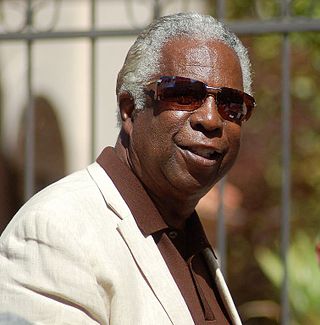
William "Mickey" Stevenson is an American former songwriter and record producer for the Motown group of labels from the early days of Berry Gordy's company until 1967.
Deke Richards, also known as Deke Lussier, was an American songwriter and record producer who was affiliated with Motown. He was a member of both The Clan and The Corporation, the latter a production team that wrote and produced some of The Jackson 5's early hits.

Ronald Anthony White was an American baritone singer and songwriter, best known as the co-founder of The Miracles and its only consistent original member. White was also known for bringing Stevie Wonder to the attention of Motown Records, and writing several hit singles for the Miracles as well as other artists including The Temptations, Marvin Gaye, and Mary Wells. White died of leukemia in 1995, at 56 years old. In 2012, White was a posthumous inductee into the Rock and Roll Hall of Fame with The Miracles.

Harold Edward Davis was an American songwriter and record producer. Davis was a producer and writer for Motown Records for nearly thirty years, and was a key figure in the latter part of the Motown career of The Jackson 5.

The Supreme Florence Ballard is a 2001 release by Universal Music Group's Spectrum Music. The release compiles the 1968 ABC Records solo recordings of Florence Ballard with four Motown tracks she recorded lead vocals for whilst in The Supremes. The ABC Records album, originally titled You Don't Have To, was shelved and bootlegged heavily preceding the compilation's release. Ballard's second ABC single, "Love Ain't Love", was covered by Udell Anderson in 1969 and by Madeline Bell in 1971.

"For Once in My Life" is a song written by Ron Miller and Orlando Murden for Motown Records' Stein & Van Stock publishing company, and first recorded in 1965.

The Supremes Sing Country, Western & Pop is the fourth studio album recorded by the Supremes, issued by Motown in February 1965. The album was presented as a covers/tribute album of country songs, as Ray Charles had done with his album Modern Sounds in Country and Western Music. However, over half of the selections on The Supremes Sing Country, Western & Pop were written in-house by Motown staffer Clarence Paul. One of the songs on the album is "My Heart Can't Take It No More", which the Supremes had recorded in 1962 and released in 1963 as a single.
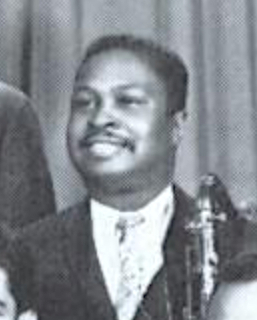
Henry R. Cosby was an American songwriter, arranger, record producer and musician who worked for Motown Records from its formative years. Along with Sylvia Moy, Cosby was a key collaborator with Stevie Wonder from 1963 to 1970. Cosby co-wrote and/or co-produced three No. 1 US hits: Stevie Wonder's "Fingertips" (1963), The Supremes' "Love Child" (1968), and The Miracles' "The Tears of a Clown" (1968).
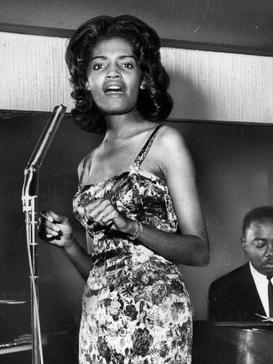
Sylvia Rose Moy was an American songwriter and record producer, formerly associated with the Motown Records group. The first woman at the Detroit-based music label to write and produce for Motown acts, she is probably best known for her songs written with and for Stevie Wonder.
Pamela Joan Sawyer is a British songwriter/lyricist, who started writing songs in the mid-1960s and whose credits as a co-writer at Motown included "Love Child", "If I Were Your Woman", "My Whole World Ended ", and "Love Hangover".
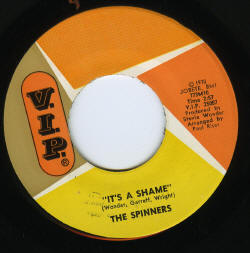
"It's a Shame" is a song co-written by Stevie Wonder, Syreeta Wright and Lee Garrett and produced by Wonder as a single for the Spinners on Motown's V.I.P. Records label. The single became the Detroit-reared group's biggest single on the Motown Records company since they had signed with the company in 1964 and also their biggest hit in a decade.

"Pops, We Love You " is a 1978 single recorded and released by Motown stars Diana Ross, Marvin Gaye, Smokey Robinson and Stevie Wonder, as a tribute to Berry "Pops" Gordy Sr., father of Motown founder Berry Gordy, who had died that year from cancer.
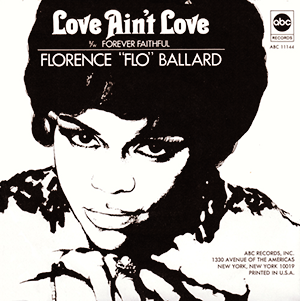
"Love Ain't Love" is the second solo single released by singer Florence Ballard, shortly after her departure from The Supremes. Robert Bateman, who produced both sides of the single, was familiar with Ballard, having "discovered" The Primettes at the Windsor Festival and attended their Motown audition.
References
- ↑ "BMI | Songview Search". Repertoire.bmi.com. Retrieved 27 January 2021.
- ↑ Adrahtas, Thomas (2006). Diana Ross: The American Dreamgirl. AuthorHouse. p. 14. ISBN 978-1425971397
- ↑ Wilson, Mary (1986). Dreamgirl: My Life as a Supreme. Cooper Square Press. p. 69. ISBN 0-8154-1000-X.
- ↑ Simmons, Rick (2018). Carolina Beach Music Encyclopedia. McFarland. p. 254. ISBN 978-1476667676
- ↑ "News". Bmi.com. Retrieved 27 January 2021.
- ↑ McCann, Ian (28 August 2020). "My Cherie Amour: How Stevie Wonder Closed The 60s With A Classic". Udiscovermusic.com. Retrieved 27 January 2021.
- ↑ Atwood, Brett. "Producer/Songster Morris Files Suit Against Motown". Billboard Magazine. pp. 11. 29 April 1995.